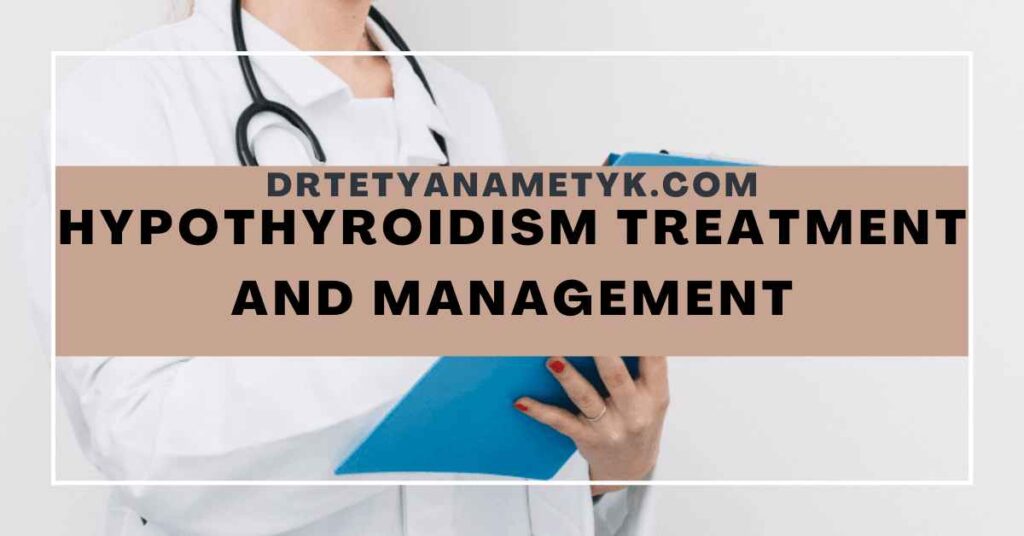Hypothyroidism is a condition in which thyroid glands are less active. In hypothyroidism, the thyroid glands do not work properly when you suffer from hypothyroidism. They produce less crucial hormones and release them into the bloodstream. Signs of hypothyroidism are not noticeable in the early stages, but they can cause severe symptoms if the condition worsens. There are several tests on which Hypothyroidism Treatment is decided for a patient.
Thyroid glands are present in the front of the neck, and the shape is like a butterfly. Thyroid hormones are triiodothyronine (T3) and thyroxine (T4). These hormones are responsible for the control of metabolism. These are made up of iodine.
Management and hypothyroidism treatment
Hypothyroidism management can be done by following several recommended tips, which are in practice worldwide. They do not entirely make your thyroid glands active but are effective in some ways.
Sleeping pattern
It is recommended that in hypothyroidism treatment, you should have a good sleeping routine of 7 to 9 hours. Establish a sleep pattern and try to follow your sleep routine, even on weekends. As per many reports, there is an increased risk of hypothyroidism occurring if you sleep less than seven hours a day. Hypothyroidism is the sole reason for weakness and fatigue.
It would be best if you took a good sleep, so your energy does not drain in a day. Sleep is directly related to metabolism and other physicochemical processes. If you suffer from insomnia or cannot fall asleep easily, ask your doctor to recommend you some pills or therapy.
Eating routine
Treatments of hypothyroidism are also hidden in your diet. Focus on your diet as well as the medication. There is a universal concept that you are what you eat, and this applies to the treatment of hypothyroidism. Have a critical look at what goes into your body. Try to add green vegetables, fruits, whole grains, and lean protein to your diet plan.
Processed foods and high carbs and fats are the enemies of hypothyroidism treatment. No matter what you are doing for the treatment of hypothyroidism, if you do not eat well, there is no use for it. Maintaining a diet can help you immensely with weight management. Consult a dietician and your doctor regarding your diet and any changes if you want to make.
Move your body
Try to engage your body in physical activities, like doing lightweight exercises, cardio, HIIT, weight training, and yoga. Use your body rightly and wisely. Get a gym membership and train under a trainer. Regular exercise and working out is a type of hypothyroidism treatment. It will help you manage your weight and especially help you destress and boost your energy.
If you do not like going to the gym, add walking, running, jogging, or any outdoor sport to your routine. But consult your doctor first before trying a new exercise. Don’t just sit and eat junk as it is dangerous for thyroids which are already not in their best condition.
Hypothyroidism Treatment
Treatment of hypothyroidism is critical, along with management and care. Following are some treatments for hypothyroidism that are suggested by endocrinologists and doctors worldwide. These hypothyroidism treatments can depend on patients’ blood tests, which indicate the levels of thyroid hormones in the blood and also the signs and symptoms of hypothyroidism.
Levothyroxine dosage for hypothyroidism treatment
The standard treatment of hypothyroidism is considered to be medication. Medication does not eradicate the disease from its root cause. Still, it can aid in the maintenance of thyroid hormones in the blood. The medication used across the globe as a hypothyroidism treatment is Levothyroxine, which is a synthetic thyroid hormone and sold under different names such as Levo-T, Synthroid, etc.
The dosage may vary based on the test results revealing your TSH levels in the blood. Also, try to take medicine daily at the same time and watch your clock. Medication can help you in the reversal of signs of hypothyroidism and restore hormonal levels.
IVs for hypothyroidism treatment
Intravenous drips are suggested as a treatment of hypothyroidism to those patients who cannot take the oral dosage of the medicines. As thyroid hormones have a long half-life and are distributed at larger volumes in blood, therefore, the patients are advised to take an intravenous replacement for a few days to a week.
More extended periods of intravenous treatment are also used for hypothyroidism treatment if the patient cannot take medications orally. IVs are used as a treatment of hypothyroidism at 70 to 80% of an oral dose of thyroid hormones because only 70-80 percent of oral medicine is absorbed.
Radioactive iodine for hypothyroidism treatment
As a treatment of hypothyroidism, a radioactive isotope of iodine (Iodine-131) is also used, which is prescribed in the form of pills or liquids if required, and the patient cannot take the pills. For the treatment of thyroid cancer, which has been spread to other parts of the body, radioactive iodine is usually used. It works as it destroys the tissues of the thyroid glands, and it remains in the body for some days.
Surgery for hypothyroidism treatment
Surgery is the last treatment of hypothyroidism when the condition of thyroid glands is so worst, i.e., goiter, that no other treatment works. In goiter, there is an abnormal growth of the thyroid glands, and these glands are non-cancerous in most cases. It is suggested to the patients who have swollen and visible thyroid glands that the glands should be surgically removed from the body.
Conclusion
The above article is all about hypothyroidism; what is it? What are the signs of hypothyroidism and some facts and tips for hypothyroidism? As we all know, this is a non-reverse condition. Still, the signs and symptoms can be managed by following some tips like a healthy diet, healthy sleeping patterns, physical activities that boost energy. Most importantly, regular check-ups and medication are the core treatments for hypothyroidism.
Dr. Tetyana Metyk offers hypothyroidism treatment at her clinic. You can visit her Website for further information. Also, you can Contact Us and book an appointment right away.

